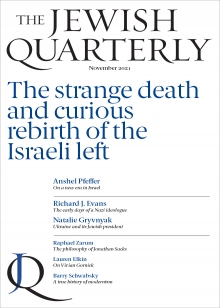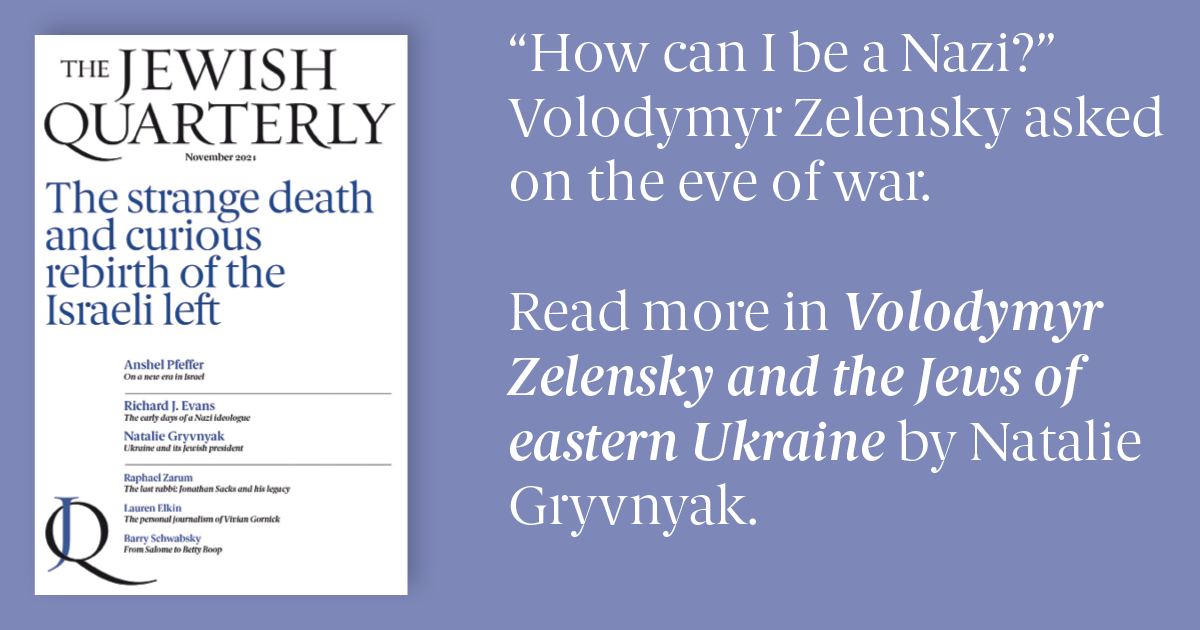
This extract is featured in The Jewish Quarterly 246: The Strange Death and Curious Rebirth of the Israeli Left.
To read the full issue, log in, subscribe or buy the issue.
In 2019, shortly after being elected president of Ukraine, Volodymyr Zelensky met with representatives of the country’s religious communities. During his meeting with leaders of the Jewish community, one of the delegates – a rabbi – recounted to Zelensky the famous exchange in which Henry Kissinger told Golda Meir: “First I am an American, second I am secretary of state and third I am a Jew,” to which Meir responded: “Henry, you forget that in Israel we read from right to left.” The rabbi then added: “Don’t forget that the Jews of Ukraine also read from right to left.” Presumably, the rabbi was not merely trying to deliver a punchline but also a Golda-esque reminder to Zelensky that he – Ukraine’s new president – is not only a former comedian, but also Jewish.
In Ukraine, Zelensky has been famous for years. Yet his Jewish identity has attracted relatively little attention. In 1997, at age nineteen, he organised the “95 Kvartal” team that participated in KVN, a Soviet-era international comedy competition that is still popular in post-Soviet countries. His team twice made the finals. Building on his fame, he organised comedy shows, and created, produced and appeared in movies and television series, including – after the outbreak of war with Russian-backed separatists – the Ukrainian version of the KVN competition. In 2015, Zelensky appeared in a television series, Servant of the People, in which he played a character who accidentally becomes president. Accidentally or not, three years later he entered politics and founded a party called Servant of the People. In April 2019, he became president of Ukraine after a landslide election victory in which he received 73 per cent of the vote.
His swift and unusual political rise overshadowed another feature of his career: he was Ukraine’s first Jewish president. Indeed, his election meant that Ukraine, for the first time in its history, had a president and a prime minister, Volodymyr Groysman, who were both Jewish and open about their origins. Yet neither promoted nor relied on his ethnicity in his politics. Nor did Zelensky’s Jewish identity play any apparent role in his career as a comedian or as a businessperson.
The more significant element in Zelensky’s political biography was that he came from eastern Ukraine – a region where Russian is widely spoken alongside Ukrainian – and developed his political and business ties there. He grew up in Kryvyi Rih, a steel-making city in central-eastern Ukraine with a population of more than 600,000.
Tatiana Tsyba, a former media and public communications adviser who is now an MP in the Servant of the People party, was a childhood friend of Zelensky’s. “We were raised in the 95th Kvartal neighbourhood of Kryvyi Rih, a district composed of many families of engineers, professors: intellectuals,” she recalls. “We were lucky to be studying in the prestigious gymnasium reading Mikhail Bulgakov and Solzhenitsyn, and in our spare time we were hanging out and listening to the Beatles.”
Tsyba says Zelensky almost never mentioned his Jewish background, and it wasn’t something people would talk about. “It never mattered … There were a lot of Jewish people around yet there was no particular interest in who was who. Neither were there any bad feelings towards Jews.”
Zelensky’s father was a professor at the Kryvyi Rih National University, a mathematician and head of the informatics department. His mother, now retired, also has an engineering background. “[We were] an ordinary Soviet Jewish family,” Zelensky told The Times of Israel in 2020. “Most Jewish families in the Soviet Union were not religious.”
The first Jewish merchants and craftsmen had arrived in Kryvyi Rih and the surrounding Dnipro region in the 1860s, and the construction of factories in the 1930s led to an influx of Jewish workers. But much of the community was scattered or murdered during the Nazi occupation in World War II, and any surviving Jewish institutions such as schools and synagogues were closed during the Soviet era.
As a child, Zelensky had little connection to Kryvyi Rih’s Jewish community. Instead, his Jewish ties have largely been to the community of Dnipro, the largest city in the region. Shmuel Kaminetsky, the chief rabbi of Dnipro, which now has about 50,000 Jews, met Zelensky in 2010 after inviting the comedian to perform at a Purim celebration. Since then, they have met on various occasions, including at the new president’s meeting with the Jewish community in 2019.
Kaminetsky’s parents emigrated from the Soviet Union to Israel and returned to Ukraine as part of a wave of Chabad rabbis who have attempted to revive Jewish culture in former Soviet territory.
During the days of the Russian Empire and then the Soviet Union, says Kaminetsky, “people were changing their names, and were living in suffering and fear”. But the Jewish community of Dnipro and the surrounding region is now one of the strongest in Ukraine.
“It was hard at first,” he says. “There were not even ten people to attend synagogue when I came with my family to Dnipro. The KGB was following us around. Yet step by step, we started to change this. We started with festivities, concerts. We started to switch suffering to pride.”
Dnipro now has ten synagogues, and a sprawling community centre, Menora – nicknamed, locally, “a country within the country” – which was funded by donations from Ukrainian oligarch Igor Kolomoisky and other business figures. Believed to be the largest Jewish community centre in the world, it consists of a hotel, business centre, concert hall, schools, a kindergarten and a medical centre that has been used for Covid-19 vaccinations. It is visited by over 40,000 people daily. Today, says Kaminetsky, “everyone is Jewish in Dnipro – even if they are non-Jewish”.
Yana Dobroserdova, a local entrepreneur who is not Jewish but has Jewish roots, says she didn’t even know that Zelensky was Jewish. “We are so intermixed; everyone has either a brother or friend with a Jewish background.”
In the past decade, Ukraine has experienced a revolution, the annexation of Crimea and a war on its eastern front. In each case, the Jewish community was a visible presence at the frontlines. From 2013, members of the Jewish community were active during the Euromaidan demonstrations that led to the ousting of the pro-Russia president Viktor Yanukovych, and they also joined the battle against Russian-backed separatists in the east. In 2014, Kolomoisky, who was the governor of the Dnipro region, funded a volunteer battalion to prevent the region suffering the fate of the Donetsk and Luhansk regions, parts of which are now occupied by separatists supported by Russia. In late 2015, a Jewish sub-group – complete with its own mobile synagogue – was formed as part of the Ukrainian Volunteer Army, led by Dmytro Yarosh, an ultra-nationalist. Some Israelis also come to fight for Ukraine.
Asher Cherkasskiy, a well-known activist and volunteer fighter in the war, is an observant Jew who maintained religious practices while on the frontline. Formerly a deputy in Dnipro’s city council and now a board member of the city’s veterans’ union, he said the local Jewish community played a major role in defending the region: “That all had an impact on the level of trust of Jews and its representatives in Dnipro, not only in the region itself but in Ukraine as a whole.”
Zelensky’s career unfolded in this changing Ukraine. Though a survey in 2019 by the Anti-Defamation League found some antisemitic stereotypes remain, a study by the Pew Research Center in 2018 – which Zelensky has cited in interviews – found that Ukraine had the lowest rate of antisemitism in Eastern Europe. This conclusion matches research by Ukrainian Jewish organisations.
Zelensky’s Jewish identity did not prevent him from becoming a popular celebrity or politician, and was not a significant feature of his career or his campaign. Yet his background, and his links to the thriving and prominent Jewish community in Dnipro, reveal much about the nature of politics and power in modern Ukraine. Konstantin Batozkiy, a political analyst, says Zelensky’s dealing with the Dnipro Jewish community was “practical when [the connections were] needed for him”. “People sometimes are coming to the community because it opens possibilities for them,” he says.
And the Dnipro community is a place of connections. It has a concentration of figures who have had an impact on the region’s and nation’s economy and politics, including Viktor Pinchuk, a businessman, politician, billionaire oligarch and philanthropist and son-in-law of the second president of Ukraine, Leonid Kuchma. There was also Hennadiy Korban – a businessman and founder of the small nationalist party Ukrop, which was informally linked to Zelensky’s party. And there was Kolomoisky, a businessman, politician and public figure, and the eighth-richest person in Ukraine. He has been president of the United Jewish Community of Ukraine, vice-president of the Football Federation of Ukraine and president of the European Jewish Union. He also had business dealings with Zelensky’s entertainment company Studio Kvartal 95 and owned the broadcaster that aired Servant of the People.
In 2016, Kolomoisky, who was accused of stealing billions of dollars from a bank he owned, fled to Switzerland and then Israel. Zelensky visited him regularly in each place. Weeks after Zelensky’s election, Kolomoisky returned to Ukraine. The oligarch has since been put on a sanctions list by the Biden administration. At the moment, Zelensky is avoiding acknowledging public ties to his former business partner.
Josef Zissels, co-chairperson of Jewish Organizations and Communities of Ukraine, says Zelensky’s Jewish background has been less important to his public standing than his ties to Kolomoisky. The association between the pair, he says, risks being “toxic in people’s minds”.
As president, Zelensky has ended up being not so bad for his opponents and not so good for his supporters. Since being elected, his approval ratings have dropped, due to his unfulfilled promises and scandals within his party and administration. Yet his action against pro-Russian oligarchs – particularly the TV channels and businesses of Russian-backed Viktor Medvedchuk – have boosted his popularity.
Zelensky’s rhetoric – and his approach to Ukraine’s history – has tended to be less fervently nationalistic than that of his predecessors. Yet he has started to position himself as more pro-Western, and to talk more with nationalist organisations, after his earlier rhetoric proved unpopular. Former Kyiv Post news editor Matthew Kupfer says it is difficult to say whether Zelensky’s approach stems from being Jewish or being from eastern Ukraine, “which has traditionally been less enthralled with Ukrainian nationalism than the country’s west”.
Vyacheslav Lykhachev, head of the National Minority Rights Monitoring Group, says Zelensky was affiliated with Kolomoisky’s media and empire but “didn’t become its marionette”. “There is more negativity towards Kolomoisky in general than to Jews. There would be a much bigger wave of hatred if that affiliation to Kolomoisky – or the idea that [Zelensky] had been put in the position by Dnipro oligarchs – had a place in people’s minds.”
Lykhachev says that Zelensky, if anything, benefited politically from being Jewish – he was seen as a “smart Jewish boy”. But his Jewishness was not the most important factor. “What matters in Ukraine is the region you are from,” he explains. “Dnipro was a Soviet-urbanistic region during USSR times. The philosophy of the region is ‘It doesn’t matter’. This is exactly the approach that formed Zelensky’s philosophy.” ▤






